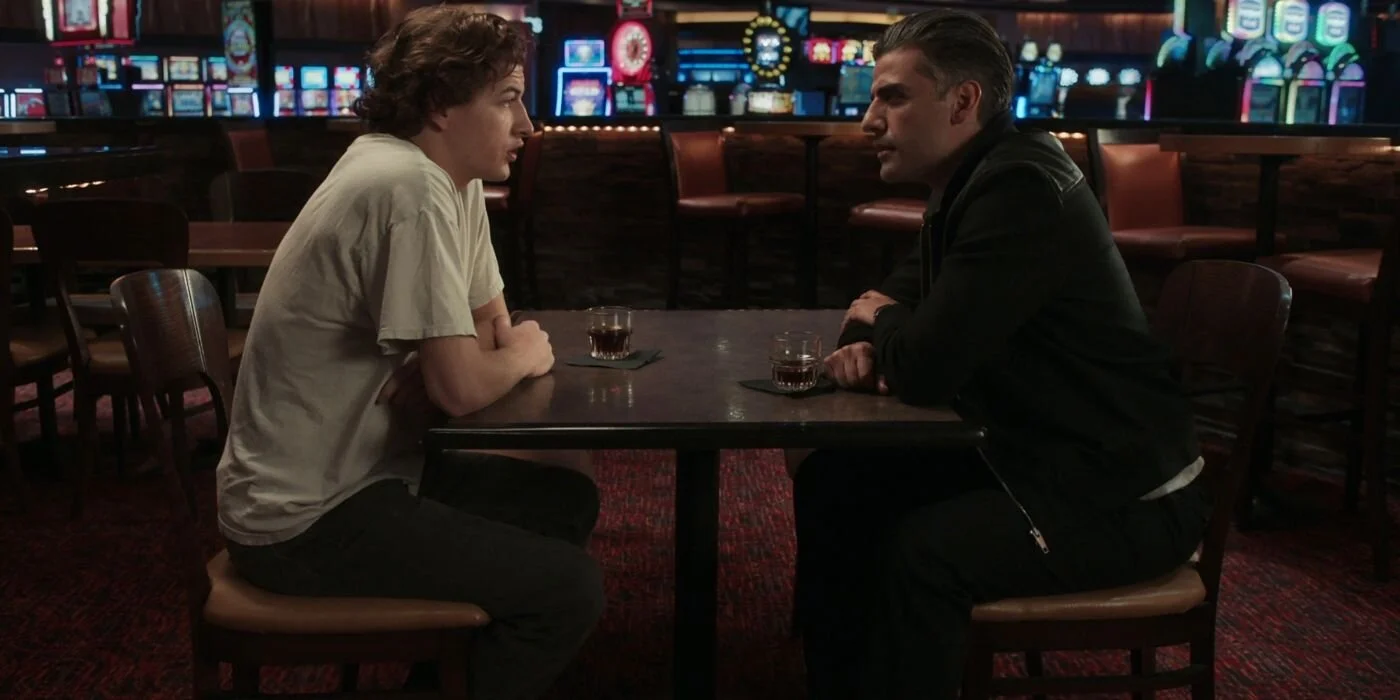'The Card Counter' Review: A Gamble That Doesn't Quite Pay Off
Oscar Isaac in THE CARD COUNTER.
Don’t place your bets too high on this one.
Imagine the illegitimate love child of ‘Rounders’, ‘Drive’ and ‘The Big Short’. Then imagine that it was haphazardly executed with a weak script and had no clear direction or intention. That’s ‘The Card Counter’, the latest film from writer/director Paul Schrader. Though not every project is expected to be a hit, it’s a surprising result from the auteur who is otherwise stacked with credits: he frequently collaborates with director Martin Scorsese and wrote the screenplays for several of his renowned films, such as ‘Taxi Driver’, ‘Raging Bull’, and ‘The Last Temptation of Christ’. Schrader was even recently nominated for an Oscar in 2019 for ‘First Reform’, a film he also wrote and directed. So, what went awry with his latest?
For starters, the film is tonally and stylistically all over the place. Set in the underground world of gambling, the film is visually successful at painting a dark, alluring, and mysterious palette. While this is pleasing to the eye and helps to set the environment, this wash does not remain consistent over the entire film and therefore can feel like a jump when the viewer is suddenly placed into an environment that doesn’t match. The cinematography of the film shares these same inconsistencies; there are an overwhelming amount of long dolly shots that rarely function to serve the story. Long takes that hold for 5- to 10-seconds longer than they should, static wide shots that don’t do anything other than make the audience wish to be closer to the characters, or too many direct close-up shots where the actor is just uninterestingly placed in the middle of the screen. This repetition on screen becomes dull quickly, and is really only saved by the out-of-place, yet visually compelling fisheye lens used when the story flashbacks to the characters in prison.
Oscar Isaac in THE CARD COUNTER.
The main plot of the film follows William “Bill” Tell (played to his best ability by Oscar Isaac; truly the only actor in the film who seemed capable of carrying any line of dialogue), a former military interrogator who now spends his quiet and lonely days as a card player. He meets Cirk (“It’s like ‘Kirk,’ but with a ‘C,’), a young man on a path for revenge towards a former colonel that both Cirk and Bill have a history with. Soon after, Bill meets financier La Linda (played by a very out-of-place Tiffany Haddish, who sadly has absolutely zero on-screen chemistry with Isaac), whom he quickly gains an affinity for. Quickly seeing the dark path that Cirk is heading towards, Bill and La Linda work to take him under their wings in the card-playing world and seek to protect him from his own actions. This plot would be interesting…if the script wasn’t filled with cringe-worthy and outright laughable moments.
Cirk is played by Tye Sheridan, a young actor who has more than proven himself since his film debut in 2011’s ‘The Tree of Life’ alongside Brad Pitt. Yet, as Cirk, either due to an underdeveloped character with a predictable arc, or due to the bland dialogue, Sheridan has probably the worst delivery of any of the lines. One would almost think he was phoning the performance in if it weren’t for the impressive cast and crew he was getting to play alongside. The film even manages to waste an unexpected, but welcomed supporting role from Willem Dafoe, who plays the titular Gordo, the military colonel being sought after by Bill and Cirk. Dafoe is the only other actor besides Isaac seeming to put any genuine attempt into the role, but even his undeniable talent can’t save what is overall just a lazy and uninspired story.
Tye Sheridan and Oscar Isaac in THE CARD COUNTER.
Perhaps the film could have been successful in the hands of another person. Sometimes, in Hollywood, there’s not enough people in the room saying ‘no.’ If Schrader had elected to only write or direct, rather than tackle both (though he’s proven himself perfectly capable of it before), the film might have been an overall more cohesive project. Someone like Adam McKay may have been better equipped to jazz up the script and sharpen the words into weapons for the characters, or maybe someone like Drew Goddard could have pulled stylistic inspiration from the likes of his film ‘Bad Times at the El Royale’ and injected some much-needed flair into the film. While the movie as a whole is not overall unwatchable, it is at the very least underwhelming and leaves the audience wanting more.



